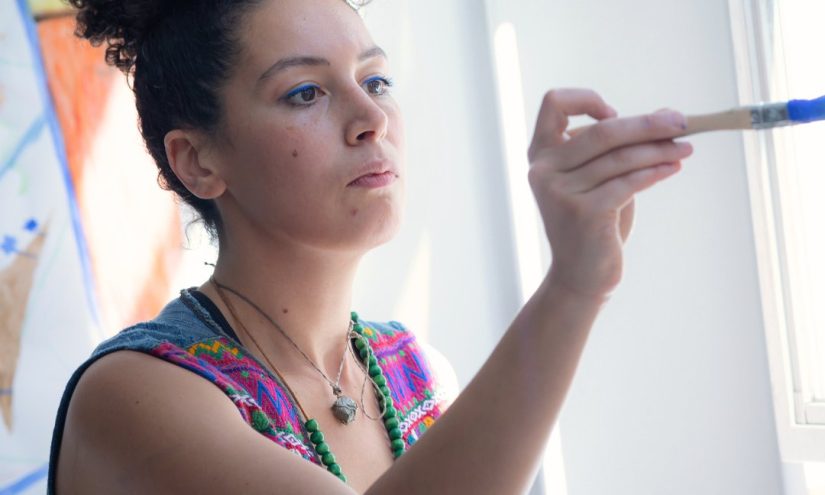


Facilitating workshops in both English and Arabic, Mahdy specialises in painting community murals, exploring cyanotypes, and reinterpreting archival media, as well as production and storyboard design.
Artichoke’s Summer School is a free, week-long programme offering creative workshops for young people from low-income families. Participants collaborate with practising artists, exploring a variety of creative fields in both studio settings and cultural venues.
Thanks to everyone who supported our participation in The Big Give Christmas Challenge, which took place from 3–10 December. Together, we raised over £10,000 to help fund the next Artichoke Summer School in 2025. Below, Tasnim Mahdy reflects on the lasting impact of summer programmes and their role in inspiring the next generation of artists.
Listen to the interview:
I’m with [the participants] from the start of the week to the end, facilitating in a way that meets everyone’s needs. They’ve had the most amazing guest facilitators come through and teach them so many different things. We’ve had an incredible range of activities — street art, collage, rap writing, circus, and so many others. We’ve worked with loads of materials, trying out new things.
We’re really lucky with all the participants – everyone’s had so much development and they are all so creative. This group has been expressive and open to so much. Everything that was created felt really personal to them and that was really special.
The most rewarding thing is having a full week together, coming every day and showing up, making that choice. We all explore different things and there’s a type of honesty that exists in the space. Everyone has opened up a little and made their own friendships. It’s rewarding knowing that they’ve also made connections.
“They can walk away knowing there’s a space for them in art, but also with each other.”
When I walk into a workshop, it’s about being able to feel like art is accessible, that it’s yours, and having fun. It’s not like school… it can be so easy for us to go into it that way. With this group of kids, it’s a collaborative space where we’re all kind of playing. They’re developing the creative skills they already have, but getting messier with it and not being perfectionists. It’s about the process, not just the final product we have at the end of the week.
“Getting out of the school mentality with art – being able to make mistakes, be silly, be playful, and tell your truth.”
Seeing the participants reflect on the art was powerful. They’ve appreciated the safe, creative space and made friendships, which seems to be a big thing.
“Everyone has come into confidence, knowing that art is absolutely free and autonomous.”
We even had a participant come back from last year, and seeing her confidence progress has been incredible.
I’ve learned so much – it’s always humbling and grounding. Adapting and being flexible has been a learning experience… sometimes plans don’t work, and that’s okay.
There’s something special about having a space that’s free for kids to explore new things and connect with others, especially before GCSE and A-level spaces, where many young people leave art behind. It’s not about being born talented or sticking to one medium. Art is for everyone.
“Programmes like these are crucial because they make art fun and accessible, especially for those who can’t afford it.”
For a lot of us art isn’t accessible. I’m a self-taught artist and everything I’ve learned has been via facilitating. It’s really important that programmes like Summer School are supported, especially for those who cannot normally afford it.
Thank you to everyone who supported our involvement in The Big Give Christmas Challenge. The campaign is now closed, but you can still read more about the amazing experiences our participants had during Summer School here.